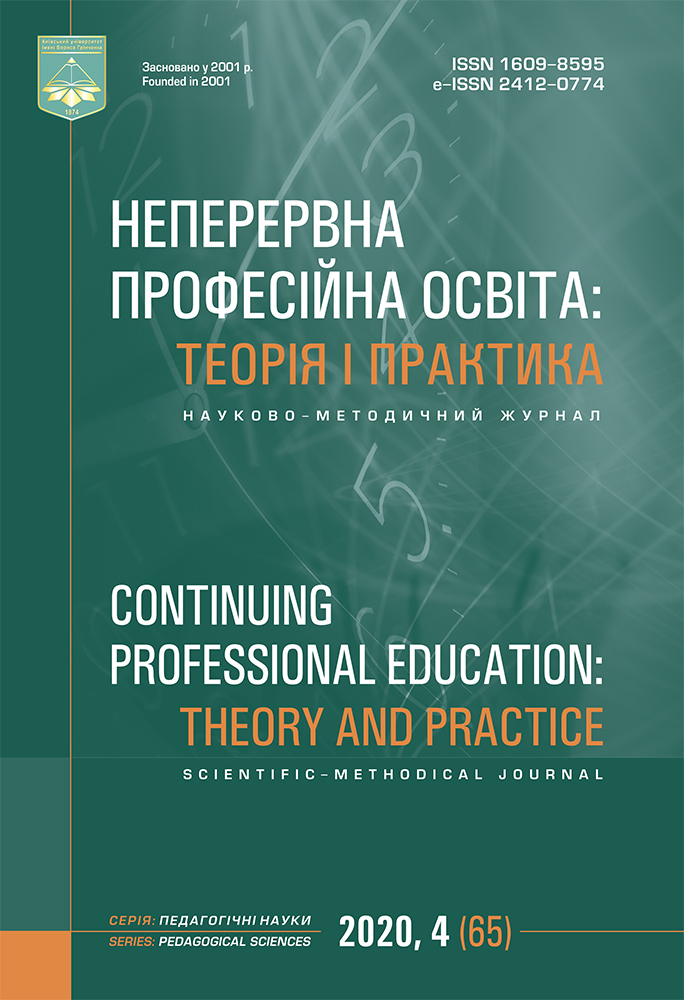ACADEMIC STAFF RESEARCH PERFORMANCE EVALUATION: THE FOREIGN EXPERIENCE
DOI:
https://doi.org/10.28925/1609-8595.2020.4.12Keywords:
alternative metrics, career attractiveness, evaluation of researchers, research competencies, peer-review, principles of evaluationAbstract
The problem of evaluating the university faculty research performance in the European Higher Education Area and in the European Research Area is enlightened in the paper. It is emphasized that under the transition to open science and open access and increasing digitalization, that has emerged in the higher education system due to the global COVID-19 pandemic, the problem of academic staff research performance evaluation and their career attractiveness needs to be reconsidered. The article analyses the key principles of evaluating researchers and their professional development; they are enlightened in the basic regulations of the European Commission, European University Association and European Research Area, and in the Hong Kong Principles as a part of the Open Science and Open Access Initiative. The issue of using almetrics in evaluating research outputs is actualized; it provides the «visibility» of the researcher not only for the scientific or educational community, but also for society as a whole. This expands the scope of usual indicators of research performance and provides a comprehensive and more objective measurement of researchers’ excellence. The structure of research performance evaluation is given; it should be based on an integrated approach, taking into account the peer-review, quantitative and qualitative measurements, and include all the components of university staff research activity, i.e. the scientific creativity potential and its research outputs, research supervision, young scientists’ mentoring, national and international cooperation, performing administrative duties, research dissemination, and mobility.References
Blaškováa, M., Blaškoa, R., Kucharþíková, A. (2014). Competences and Competence Model of University Teachers. Procedia – Social and Behavioral Sciences, 159, 457–467. https://doi.org/10.1016/j.sbspro.2014.12.407
Code of Practice for Research. Promoting good practice and preventing misconduct. (2009). https://ukrio.org/wp-content/uploads/UKRIO-Code-of-Practice-for-Research.pdf
Crosier, D., Kocanova, D., Birch, P., Davykovskaia, O., Parveva, T. (2017). Eurydice Brief. Modernisation of Higher Education in Europe: Academic Staff. https://eacea.ec.europa.eu/national-policies/eurydice/content/modernisation-higher-education-europe-academic-staff-%E2%80%93-2017_en
Darroch, P.I., Colledge, L. H. (2016). Using research metrics responsibly and effectively as a researcher. ETH Zurich. https://doi.org/10.3929/ethz-a-010744984
EURASHE’s 10 Commitments for the EHEA in 2020 – Vision & Strategies (2012). EURASHE. https://www.eurashe.eu/library/mission-phe/EURASHE_10_Commitments_for_EHEA_in_2020_March2010.pdf
European Commission Expert Group on Altmetrics (2017). Next-generation metrics: Responsible metrics and evaluation for open science. Publications Office of the European Union. https://publications.europa.eu/en/publication-detail/-/publication/b858d952-0a19-11e7-8a35-01aa75ed71a1
Kalpazidou, S. E.; Bührer, S.; Schraudner, M.; Reidl, S.; Müller, J.; Palmen, R.; Haase, S.; Graversen, E. K.; Holzinger, F.; Striebing, C.; Groó, D.; Klein, S.; Rigler, D.; Høg, U. E. (2018). A Conceptual Evaluation Framework for Promoting Gender Equality in and Innovation. https://www.efforti.eu/sites/default/files/2018-03/EFFORTI%20D3.3%20FINAL%20report%2027032018.pdf.
Kobayashi, S., Dolin, J., Søborg, A., Turner, J. (2017). Building Academic Staff Teaching Competencies: How Pedagogic Continuous Professional Development for Academic Staff Can Be Organised and Developed in Research-Intensive Universitie. In: Stensaker B., Bilbow G., Breslow L., van der Vaart R. (Eds.), Strengthening Teaching and Learning in Research Universities (pp. 103–128). Palgrave Macmillan, Cham. https://doi.org/10.1007/978-3-319-56499-9_5
Moher, D., Bouter, L., Kleinert, S., Glasziou, P., Sham, M. H, Barbour, V., et al. (2020). The Hong Kong Principles for assessing researchers: Fostering research integrity. PLoS Biology, 18 (7), e3000737. https://doi.org/10.1371/journal.pbio.3000737
Morais, R., & Borrell-Damián, L. (2018). Open Access in European universities: Results from the 2016/2017 EUA institutional survey. EUA. https://eua.eu/resources/publications/324:open-access-n-european-universities-results-from-the-2016-2017-eua-institutional-survey.html
Priem, J., Taraborelli, D., Groth, P., Neylon, C. (2010). Altmetrics: A manifesto. http://altmetrics.org/manifesto
Saenen, B., Borrell-Damián, L. (2019). Reflections on University Research Assessment: key concepts, issues and actors. https://eua.eu/resources/publications/825:reflections-on-university-research-assessment-key-concepts,-issues-and-actors.html
Saenen, B., Morais, R., Gaillard, V., Borrell-Damián, L. (2019). Research Assessment in the Transition to Open Science. https://eua.eu/resources/publications/888:research-assessment-in-the-transition-to-open-science.html
Schiffbänker, H., Research, J. (2020). Grant allocation and gender disparity: identifying the bias factors. https://eua.eu/resources/expert-voices/154:grant-allocation-and-gender-disparity-identifying-the-bias-factors.html
The European Charter for Researchers & the Code of Conduct for their Recruitment. Європейська хартія дослідників та Кодекс працевлаштування наукових працівників (2005). http://h2020.com.ua/wp-content/uploads/2015/11/Book.pdf
The European University Association and Science Europe Join Efforts to Improve Scholarly Research Assessment Methodologies (2019). http://www.scienceeurope.org/media/xybdxw0e/joint-statement-eua-se-on-research-assessment-1.pdf
The National Academies Press. Fostering Integrity in Research (2017). https://sites.nationalacademies.org/PGA/PGA_178432
Togia, A., Koseoglou, E., Zapounidou, S. (2017). Alternative Metrics for the Evaluation of Scholarly Activities: An Analysis of Articles Authored by Greek Researchers. https://www.academia.edu/33686475/Alternative_Metrics_for_the_Evaluation_of_Scholarly_Activities_An_Analysis_of_Articles_Authored_by_Greek_Researchers
Downloads
Published
How to Cite
Issue
Section
License
Copyright (c) 2020 Iryna Reheilo

This work is licensed under a Creative Commons Attribution-NonCommercial 3.0 Unported License.



